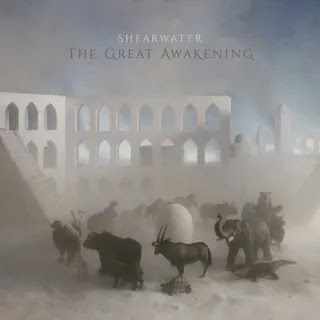The first album in six years from Jonathan Meiburg and co. returns to the band’s patient style of baroque, naturalistic art-rock.
Shearwater had largely stayed out of politics until the grim state of American affairs caused Jonathan Meiburg to change his tune in 2016. This trajectory describes at least several thousand other indie artists, but Meiburg was ahead of the curve: Shearwater concerned themselves not with their usual ornithological studies nor geographical arcana on their atypically strident Jet Plane and Oxbow, released at least 10 months before the wave of newly activated resisters rose in November. It would be completely logical for Shearwater to continue in this direction, but while there’s been unlimited material to spark outrage, Meiburg has discovered outrage itself is not a renewable resource. After spending at least a half decade buckling under the oppressive weight of worldly horrors and hopelessness, The Great Awakening bravely and perhaps naively offers counterprogramming, going inward to imagine a landscape unscarred by human treachery.
As the first Shearwater album in six years, The Great Awakening is a return to form by default. Meiburg’s projects in the time since have been logical extensions of Shearwater’s ornate, earthy, and occasionally academic mien—collaborating with former tour openers Cross Record to make frequently stirring music as Loma and penning A Most Remarkable Creature: The Hidden Life and Epic Journey of the World’s Smartest Birds of Prey, a celebrated work on his most frequent subject. But his previous two Shearwater albums felt intended as a response to the increasingly precious pretense of his “Island Arc,” pivoting towards rock musculature and scene-chewing synth-pop. Animal Joy and Jet Plane were the first time Shearwater sounded conversant with larger trends in indie rock, whereas The Great Reawakening is as much of an about-face sonically as it is spiritually, revisiting a baroque, naturalistic form of art-rock with almost no contemporary peers.
“Enough of this sad dreaming of country life,” Meiburg booms during “Empty Orchestra,” The Great Awakening’s pulse-quickening outlier; it’s a wish to be fully marooned from modern civilization and also a likely shout to Roxy Music, a suitable comparison that started emerging more on Jet Plane. It’s probably the latter, given the King Crimson easter egg in the record’s first line: “Here comes your heart attack/Starless and bible black/And here is the endgame.”
From that point forward, The Great Awakening imagines life taking shape after a spiritual death, emerging from pitch black to a blank slate of blinding white. In his authorial and musical pursuits, Meiburg is unafraid to practice patience to document a beauty that can’t be forced. “There’s no reason to cry,” he intones early on, letting the sentiment linger for nearly six minutes without rushing towards a resolution. The Great Awakening often unfolds at the pace of time-lapse video of land masses forming or plants springing into bloom, orchestrated with enough horns and strings to skew prog, though quiet enough to pass for minimalism. On “Everyone You Touch,” Meiburg is close-mic’d enough to hear his breath and fingers sliding across the fretboard, though the production and his mannered vocals render it both intimate, opulent, and ghostly, like watching an esteemed stage actor rehearse in an empty amphitheater.
Many have paid homage to Mark Hollis since he stepped away from the music industry, but few have walked it like they Talk Talk talk it quite like Shearwater; at their best, Meiburg has conjured not just the incapacitating enchantment of our surroundings, but its terrifying, destructive, and unknowable capacities. But The Great Awakening lacks the latter as counterpoint compared to the band’s peak on 2008’s Rook, as the unyielding prettiness sets a mood that blunts the dynamic arc. “Laguna Seca” recalls the bristling mood of Jet Plane, though Meiburg’s stentorian howl renders “fortune favors the undertone of ugliness” as a biblical proclamation rather than a commentary on 2022. Yet even the gnarlier elements—distended, tribal drums and an unexpectedly acute melodic angle on the chorus—never exert their will on the listener. The run of “Milkweed,” “Detritivore,” and “Aqaba” is quintessential Shearwater in both their titles and the tendency to let the middle of their albums coast by like a warm, welcome breeze.
The Great Awakening is often so sonically captivating that it doesn’t take much for Shearwater to engage: “Xenarthran” and “There Goes the Sun” are barely louder than what surrounds them but land with more impact, with the faintest arpeggiated bassline or implied percussive pulse having more in common with Kompakt microhouse than their peers in indie rock’s aughts-era drama club. Likewise, although the references to encephalons and armadillos let you know that Meiburg is back in his bag, it’s a moment of unadorned poetry that best gets his point across. “God lives in the mind/But in the mind it’s alive,” he beams, offering the best and perhaps only way out of our worldly hell.



0 comments:
Post a Comment